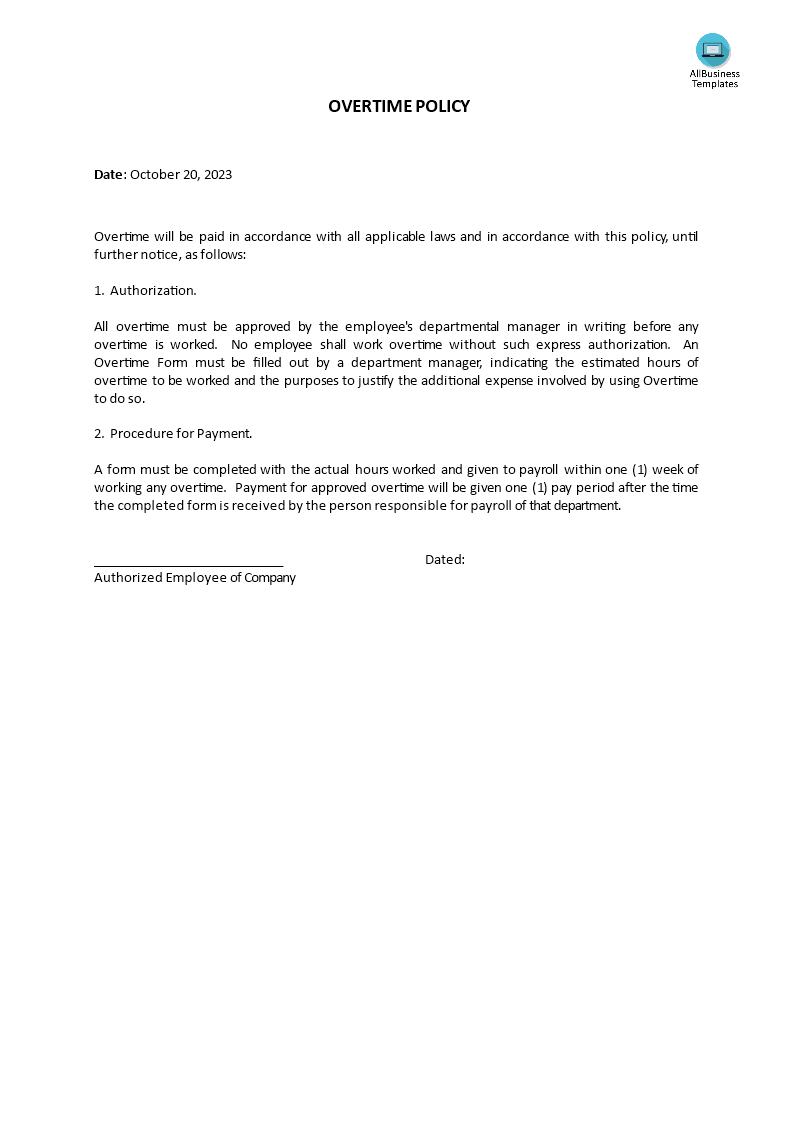Overtime Policy
Save, fill-In The Blanks, Print, Done!

Download Overtime Policy
Today: USD 2.99
Download It Now

Available premium file formats:
Microsoft Word (.docx)- This Document Has Been Certified by a Professional
- 100% customizable
- This is a digital download (23.63 kB)
- Language: English
- You will receive a link to download the file as soon as your payment goes through.
- We recommend downloading this file onto your computer.
How to write an overtime policy? In what way does the overtime policy serve the purpose of the company? Our Overtime Policy template provides a clear and comprehensive guide to implementing overtime policies in your organization. It includes all the information you need to create a fair and effective overtime policy. Download this Overtime Policy now!
An Overtime Policy is a set of guidelines and rules established by an employer that defines how overtime work is managed, compensated, and regulated within the organization. It outlines the conditions under which employees are eligible to work overtime, how they will be paid for their additional work hours, and any related procedures and expectations. Overtime policies are designed to ensure that both employers and employees understand the rules governing overtime work and to promote fairness and compliance with labor laws.
Here are key components and considerations typically addressed in an overtime policy:
- Eligibility: The policy specifies which categories of employees are eligible for overtime pay. In many countries, labor laws define who is eligible for overtime, often based on factors such as job classification, salary level, and employment status.
- Overtime Definition: The policy provides a clear definition of what constitutes overtime work. This typically includes any hours worked beyond the standard workweek or workday, as defined by labor laws or company policies.
- Rate of Pay: The policy outlines the rate at which employees will be compensated for overtime hours. In many cases, overtime pay is set at a premium rate, often 1.5 times or 2 times the employee's regular hourly wage.
- Work Scheduling: The policy may address how overtime work is scheduled and how employees are informed of overtime opportunities. It may include provisions for voluntary overtime and mandatory overtime (when required by business needs).
- Approval Process: Procedures for requesting and approving overtime work are often detailed in the policy. This includes who has the authority to authorize overtime hours.
- Record-Keeping: The policy may require employees to accurately record their hours worked, including overtime hours, and provide guidelines for doing so.
- Compensation: It explains the timing and method of payment for overtime work. This may include details on when overtime pay will be included in regular paychecks.
- Overtime Limits: Some policies set limits on the number of overtime hours an employee can work in a given week or pay period to prevent excessive overtime and fatigue.
- Meal and Rest Breaks: Provisions for meal and rest breaks during extended work periods may be included, in compliance with labor laws.
- Compliance with Laws: The policy ensures that overtime practices align with local labor laws and regulations.
- Exemptions: It may address exemptions for certain categories of employees who are not eligible for overtime pay, such as salaried employees classified as exempt under the Fair Labor Standards Act (FLSA) in the United States.
- Communication: Employers typically communicate the overtime policy to all employees to ensure they are aware of their rights and responsibilities.
Overtime policies are essential for promoting transparency and fairness in the workplace and for ensuring that employers comply with labor laws and regulations. They also help manage labor costs effectively by providing guidelines for controlling overtime expenses.
Download this professional legal Overtime Policy template if you find yourself in this situation and save yourself time, and effort and probably reduce some of the lawyer fees! Using our legal templates will help you reach the next level of success in your education, work, and business! However, we still recommend you to consider consulting a local law firm in case of doubt to support you in this matter.
DISCLAIMER
Nothing on this site shall be considered legal advice and no attorney-client relationship is established.
Leave a Reply. If you have any questions or remarks, feel free to post them below.
Related templates
Latest templates
Latest topics
- GDPR Compliance Templates
What do you need to become GDPR compliant? Are you looking for useful GDPR document templates to make you compliant? All these compliance documents will be available to download instantly... - Google Docs Templates
How to create documents in Google Docs? We provide Google Docs compatible template and these are the reasons why it's useful to work with Google Docs... - IT Security Standards Kit
What are IT Security Standards? Check out our collection of this newly updated IT Security Kit Standard templates, including policies, controls, processes, checklists, procedures and other documents. - Letter Format
How to format a letter? Here is a brief overview of common letter formats and templates in USA and UK and get inspirited immediately! - Google Sheets Templates
How to work with Google Sheets templates? Where to download useful Google Sheets templates? Check out our samples here.
cheese
